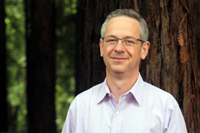Campus News
What is the role of a major research university?
By Paul Koch, Dean, Division of Physical and Biological Sciences — We’re in the midst of a seemingly endless conversation about “the value of higher education” and the role of top research universities like UC Santa Cruz. Should we pursue knowledge for its own sake? Or should we focus on creating “useful” knowledge and informed, clear-headed graduates? The answer is that we must do both.

Should we pursue knowledge for its own sake? Or should we focus on creating “useful” knowledge and informed, clear-headed graduates?
The answer is that we must do both.
Research universities must address problems of great societal need, but we must also pursue broad, basic research, because, frankly, we can’t predict what’s going to be useful. Through a combination of brilliance and serendipity, countless major transformations have come out of basic research.
Being educated at a research university, where new knowledge is created, offers undergraduates two great benefits. By observing and being part of the process of creation, students become critical thinkers, questioning the status quo. In addition, they learn how to solve new problems. These habits of the mind serve our graduates for the rest of their lives.
These benefits begin to accrue in the classroom, where students learn to recognize important problems that are worth their time. Faculty are facilitators, helping students master the basic knowledge and skills needed to solve those problems. But I believe critical thinking and problem solving really blossom outside the classroom.
UC Santa Cruz is rich with opportunities for “hands-on” learning, including courses, internships, and independent research.
I’m most familiar with courses in the sciences that engage the “real world,” such as our Marine Ecology Field Quarter course. For students like Hannah Perlkin and Emily Tucker, that class opened doors that changed their lives and had an international impact. In lab courses like Environmental Phage Biology, students collect, isolate, and sequence the genomes of viruses that attack bacteria, making real contributions to our understanding of their diversity. Beyond the sciences, history professor Alan Christie’s students did original archival research for a photographic exhibition about Okinawa, then went to the island to interview residents about the photos. These experiences engage students and test them more meaningfully than any exam could.
Internships give students the opportunity to work with corporate and community partners. We offer Health Science Internships, and our Cal Teach program sponsors internships for prospective math and science teachers. In engineering, students can participate in corporate-sponsored senior design projects.
Finally, our campus has a strong track record of championing independent student research. Alumna Julie Packard, executive director of the Monterey Bay Aquarium, still talks about how early-morning marine science expeditions shaped her experience at UC Santa Cruz. In June, bioengineering major Beau Norgeot won the Steck Family Award — the annual prize for the year’s most outstanding senior thesis — for his work on a new treatment for skin cancer.
Unsurprisingly, independent research turns out to be a strong predictor of success in graduate school. The Physical and Biological Sciences Division is investing in these opportunities. We offer science undergraduates up to $1,500 grants to support their independent work. Last year, we awarded a total of $20,000 to help students work on projects as varied as materials science and developmental biology; this year, we will award $30,000. That is about 10 percent of what we need.
These “real-world” learning experiences, coupled with our general-education requirements and extracurricular activities, help students figure out what they care about and how to have an impact. That’s self-discovery, and that’s part of our mission, too.